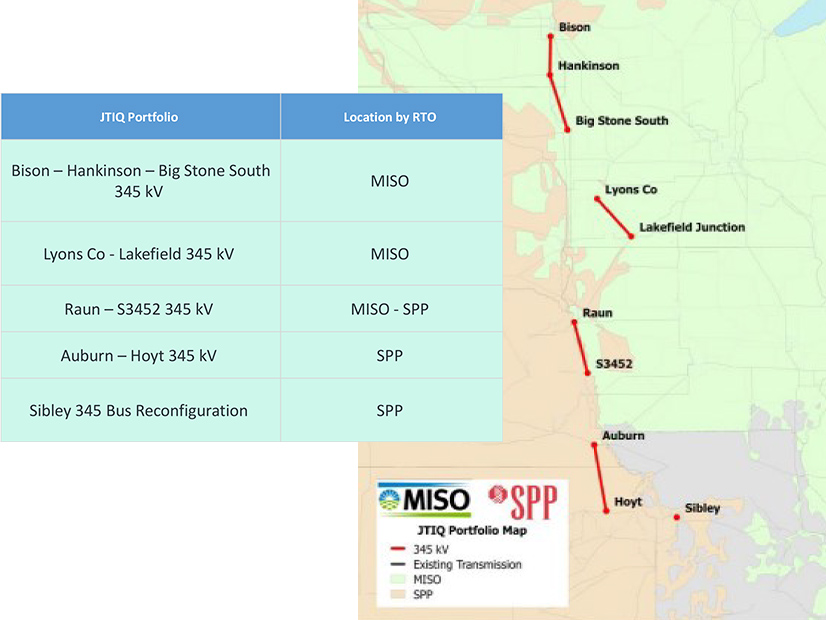
LITTLE ROCK, Ark. — SPP and MISO are coordinating responses to the August FERC filings to facilitate their Joint Transmission Interconnection Queue (JTIQ) process and cost-allocation methodology.
Clint Savoy, SPP’s manager of interregional strategy and engagement, told the RTO’s stakeholders Oct. 16 that the comment period for the filings closed Sept. 19. The RTOs have asked for an order by Nov. 14.
“There were some comments in support, some protests, some limited protests,” he said. “We’re looking to file those responses as soon as possible so that we give FERC enough time to issue a ruling in the time that we requested.”
SPP filed tariff revisions related to the JTIQ on Aug. 21 (ER24-2825) and MISO did the same Aug. 26 (ER24-2871). SPP and MISO also submitted matching modifications to the commission for their joint operating agreement (ER24-2798 and ER24-2797, respectively).
The tariff revisions have drawn nearly 50 intervenors in each docket. Six regulatory bodies have intervened, primarily over cost allocation.
The RTOs expect a grant of up to $464.5 million in matching federal funds under the U.S. Department of Energy’s Grid Resilience and Innovation Partnerships program to offset about 25% of the $1.7 billion portfolio’s capital costs that would have been charged to interconnection customers. (See MISO, SPP Ditch 90/10 JTIQ Allocation After $465M DOE Grant.)
The grid operators told FERC that JTIQ transmission owners will be “fully compensated” for capital costs associated with their respective upgrades through the portfolio subscription methodology. The costs will be covered through a combination of GRIP funding, charges to interconnection customers benefiting from the portfolio and, if necessary, temporary or permanent backstop funding from load.
The Arkansas Public Service Commission filed clarifying comments in MISO’s docket, saying it opposes the JTIQ backstop proposal. Saying it was concerned that the backstop “fails to allocate costs commensurate with the benefits received,” the APSC asked the RTO to either make the interconnection customers pay the backstop funding or allocate the costs to the subregion where the projects will be built.
The JTIQ portfolio, centered on the RTOs’ northern seam, is expected to enable 28 GW in generation additions through its backbone net. The backbone of network upgrades consists of five projects, cut down from the original seven identified by SPP and MISO:
-
- Bison-Hankinson-Big Stone South, 147 miles of new 345-kV lines in the Dakotas (MISO).
- Lyons Co.-Lakefield Junction, 80 miles of new 345-kV lines in South Dakota and Minnesota (MISO).
- Raun 345/161-kV project, new 345/161-kV double circuit, and rebuilt 161-kV lines near Omaha, Neb. (MISO, SPP)
- Auburn-Hoyt, new 345-kV lines in Nebraska (SPP).
- Expanding and rebuilding a 345-kV substation in Sibley, Iowa (SPP).
The DOE reached a cooperative agreement with Minnesota’s Department of Commerce in September. The department is responsible for administering the federal money, which will be awarded to the RTOs, TOs and other parties involved should they meet their objectives.
“That sets us up to begin establishing the processes that we need to be able to take advantage of this program,” Savoy said.
Responding to an SPP member’s question during the Oct. 16 meeting as to whether Minnesota would be able to influence the disbursement of funds, a spokesperson for the commerce department said the state won’t be “putting its thumb on the scales.”
“That would not be appropriate with federal funds,” the department’s Jessica Burdette said. “That’s not a thing people need to worry about.”
The RTOs said in their FERC filings that board approval is a “major decision point” in whether the GRIP funds can be disbursed and is based on whether the commission approves their tariff revisions and JOA updates.
Assuming FERC approval, the grid operators’ staff members plan to take the JTIQ portfolio to their respective boards’ upcoming meetings for their approval. SPP’s board meets in December and February and MISO’s in December and March.



